COVER- Tainted love: Behind the Morris Murder Trial
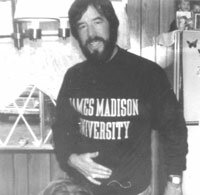
Roger Lee Shifflett was 38 years old and had five children when he was murdered.
PHOTO COURTESY JODY SHIFFLETT
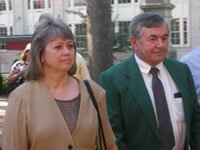
Butch Morris says he felt like he got a second chance when he married Barbara Shifflett a year after her husband was killed.
PHOTO LISA PROVENCE
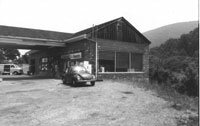
Scene of the crime: The Southwind Gas & Grocery used to stand near Avon Street Extended on Route 20 south. Roger Shifflett's green Volkswagen is parked outside on the right in this 1988 police photo.
FILE PHOTO
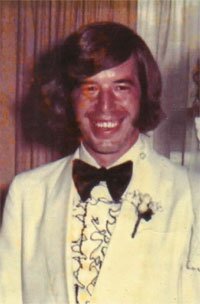
Roger Shifflett on his wedding day to Barbara in 1975. Shifflett's family members clipped Barbara out of the photo.
PHOTO COURTESY SHIFFLETT FAMILY
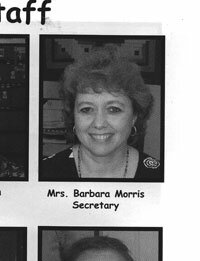
Barbara Morris is the long-time school secretary at Stone-Robinson Elementary.
PHOTO FROM STONE-ROBINSON YEARBOOK
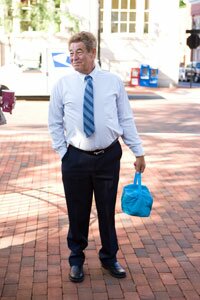
Earl Shifflett never gave up hope that someone would be charged in his brother's murder.
PHOTO BY WILL WALKER
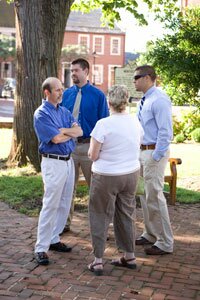
During the trial, Randy Shifflett (center) and younger brother Lee Shifflett (right) supported their stepfather Butch Morris, the man accused of killing their father.
PHOTO BY WILL WALKER
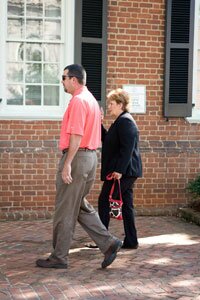
Butch Morris' first wife, Diane Houchens, was a key prosecution witness. Both of Butch Morris' estranged sons from his first marriage, Joey (pictured) and Tim, were at the trial.
PHOTO BY WILL WALKER
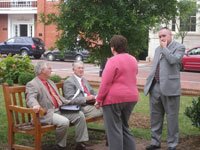
The investigators: Former Albemarle police detectives Steve Huffman and Courtney Craft thought Butch Morris was the killer in 1988, but didn't think they had enough evidence to get a conviction. Detective Phil Giles (right) picked up the investigation 20 years later, and told Morris, "Everything in the file points to you."
PHOTO BY LISA PROVENCE
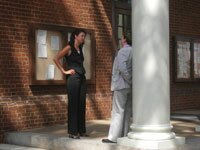
Commonwealth's Attorney Denise Lunsford spent much of the trial trying to admit evidence over defense attorney André Hakes' objections.
PHOTO BY LISA PROVENCE
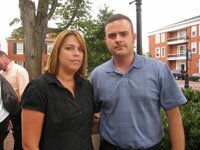
Crystal Choate and Jody Shifflett, children from Roger Shifflett's first marriage, have waited 21 years for someone to be charged with their father's slaying.
PHOTO BY LISA PROVENCE
By his own admission to police, the Alvin Lee "Butch" Morris of 20 years ago was an alcoholic, a womanizer, and a liar– a man who left his first wife and kids for a recently widowed woman.
Does that make him a murderer?
That's what a jury had to decide after five days of testimony in an Albemarle County Circuit Court trial that started July 6, when Butch Morris was tried for the 1988 murder of Roger Lee Shifflett, the husband of Barbara, the woman with whom Morris was smitten and whom he married a year after Shifflett's death.
People develop feelings for someone other than their spouse everyday. That is not unusual, nor does it make a tragic tale. But the execution-style slaying of Roger Shifflett has left a taint of suspicion on Butch and Barbara's 20 years of connubial bliss, and in the courtroom, suspicions were publicly aired.
Roger's five children who were left fatherless were there. During the trial, Shifflett's four sons sat in the front row of the courtroom– the younger three behind Butch Morris, who had raised them after their father's death, while Shifflett's oldest son from a previous marriage, Jody Shifflett, sat across the aisle behind the prosecution table, averting his eyes and on one occasion sobbing when crime scene photos of his father's body were displayed. The brothers didn't look at each other, and Jody said he hasn't talked to his younger half-brothers in four years.
Other victims of Shifflett's death were in the courtroom: Roger's siblings, who have waited 21 years for someone to be brought to justice for their brother's murder; Butch's two sons from his first marriage, who were abandoned when their father took up with Barbara and started a new life with new sons; even Butch's 87-year-old mother, who has watched her only child accused of the most heinous crime.
The prosecution presented a story not unlike Shakespeare's Hamlet, in which a man slays his rival to get the woman of his dreams. If, however, that was the plan, the dream collided with a persistent police department unwilling to let this case go totally cold.
"You and I have lived with this black cloud for 20 years," Barbara told Butch in a phone call recorded last year while he was in jail after his arrest.
Friends and family of Butch and Barbara have described them as a churchgoing, respectable couple who built a second life together and seemed– even after two decades of marriage– to be very much in love.
"There are so many things working in your favor," Barbara said during that same jailhouse call. "When we get through this," she said, "we'll live a free life. We'll have a beautiful life."
After nearly 10 hours of deliberation, the 12-member jury came back evenly split on July 13, the date that would have been Roger Shifflett's 60th birthday. The judge ordered them to return July 14 and after another three hours, announced they were "firmly deadlocked."
The Morris camp seemed shell-shocked by the news, and left the courthouse through a side exit.
Roger Shifflett's brother, sister and son smiled as they left the courthouse. "We're doing okay," said Dorothy McAllister, but otherwise declined to say more.
And as many others who've walked through the court system can attest, a verdict of guilty– or not guilty–does not guarantee justice, nor does it entirely erase the cloud of suspicion. And a hung jury leaves both sides without what they want. The accused is not vindicated, and those still mourning the victim don't see his killer punished.
In a murder trial, there is no happily ever after.
The victim
When Jody Shifflett was a boy, he wondered, "Why does Daddy work so hard?" Indeed, by all accounts, his father, Roger Shifflett, was a hardworking man employed at Norfolk Southern Railroad, who always tried to get home to close the Southwind Gas & Grocery he owned with his wife and inlaws, and who put in long hours to support his wife and children– a boy and a girl from his first marriage, and three boys from his union with Barbara.
He grew up in Crozet, the youngest son of 11 children, and was nicknamed "Rabbit." His sister, Juanita Garrison, recalled a childhood romping with her younger brothers, Roger and Earl. "We played together all the time," she told the Hook for a 2006 article about unsolved killings.
"We roamed the mountains," Garrison said. "I was a tomboy who had two boys to play with."
Roger Shifflett married young in 1967, and had Crystal and Jody. Although the marriage ended, his former sisters-in-law still think so highly of him they traveled from Waynesboro to be at the trial every day. "We just loved Roger," says one of them, Marilyn Robertson.
In 1975, Shifflett married the former Barbara Haney, and they had three more boys: twins Rodney and Randy, who were almost seven when he died, and Lee, who was three. Somehow, between work and family, he managed to squeeze in martial arts and gained a black belt in karate.
While on the outside things may have seemed normal and happy, there had been some problems in his marriage to Barbara, according to his brother, Earl Shifflett, who was two years older than Roger. He says Roger had confided to him a week before his death that he and Barbara were trying to work things out, and were taking a rare vacation for their 13th wedding anniversary. The getaway never happened.
The family has long believed that Morris and Barbara were having an affair when Roger died, and, more ominously, that both were involved with Roger's death.
It's an allegation Morris repeatedly denied to police following Shifflett's death, although his fondness for Barbara was apparent.
"We're good friends," Morris told police in a September 19, 1988, interview, a garbled tape of which was played the third day of the trial. Morris was a regular at the Southwind, and said in the tape that Barbara had confided in him about problems in her marriage.
"I told her to get out," he said.
She wouldn't have to make that decision.
On Monday, June 20, 1988– the day after Father's Day– Roger Shifflett arose early. By 5:40am, he'd left the small house on Druid Avenue he shared with Barbara and their little boys and drove his green Volkswagen Beetle through light fog the three miles down Avon Street Extended to Route 20 south to open the store.
Usually, Roger didn't open up, and brother Earl, who was due to pick him up by 6:15am and give him a ride to his full-time job at Norfolk Southern Railroad, thought it odd that Roger had been in the store that morning, especially after what happened. An ice cream box was leaking, Earl remembers Barbara telling him, and crime scene photos show a mop and bucket by the freezer.
With a light breeze blowing and the early morning temperature already approaching 70 degrees, according to weather records, Roger arrived at the store and went inside. What happened over the next 15 minutes has been a mystery for 21 years.
Shortly before 6am, employee Steve Stover, arrived to work– and to a scene of devastation.
Despite Roger's karate prowess, he'd been unable to defend himself. He was dead behind the cash register, riddled with gunshot wounds.
When police arrived at the scene 15 minutes later, $135 was missing from the cash drawer, and the cash register tape showed a sale of $1.25 made that morning– apparently sometime in the approximately 10 to 15 minutes between Roger and Steve Stover's arrivals. Did Roger make a sale to his killer before he was shot five times with a .22, including a fatal shot to the back of the head? Or was it someone he knew well?
It would be more than two decades before the case would be heard in court.
The defendant
For his court appearances, Butch Morris, 68, has worn blazers in maroon and kelly green. Even a navy blazer is enlivened with a magenta tie, and the colorful attire contrasts with the seriousness of the four felony charges he faced, including first-degree murder.
People thought he was a "playboy," he told police in taped interviews that were played in court. He "ran around," and estimated he'd had a dozen affairs while married to his first wife.
"Diane knew about half of them," he said in the interview the day he was arrested. "Once she forgives you the first time..." he trailed off. "You look back at your life and wonder what you would change," he mused.
"I'm a mama's boy," Butch also told police. He and Barbara live on Lindsay Road in the northeastern part of Albemarle County near his mother, Margaret Morris, who secured Butch's $50,000 bond with her house.
Butch wasn't so close with all members of his family, including his two sons from his first marriage who were abandoned when he divorced their mother.
Tim Morris, 47, momentarily choked up on the stand when he was asked his relationship to the defendant. "I'm his son," he said.
"He drank all the time," testified the son, who had also been employed at the Southwind Gas & Grocery in 1988 when he was in his mid-20s.
"He was not a nice person to us, and that had an effect on us." Yet at the time of the murder, Tim Morris said, his relationship with his father was improving because Butch had given up drinking.
The Morris family had lived on Route 20 about 1.5 miles south of Southwind in a rental house for five years. Butch was an assistant manager working nights at the Safeway grocery on River Road, today the site of a Tractor Supply store.
Although abuse didn't come up in court, due to pretrial agreements, there are allegations Butch had a violent side that played out during his 28-year first marriage. His first wife's brother, former Albemarle County sheriff Terry Hawkins, told the Hook in 2008, after Butch had been arrested, that he interceded one time, when he learned Butch had beaten his sister.
"I did not interfere with their personal lives," said Hawkins, "but one thing I absolutely detest is physical or emotional abuse."
By 1988, the marriage was "strained," according to testimony from the alleged abuse victim, Diane Hawkins Morris Houchens, now remarried.
In a conversation on June 11, 1988– nine days before Shifflett was killed– "He said, ‘I don't want to be married to you anymore," she told the jury.
And a few days later, on June 17, the Friday before the Monday murder, Houchens came home for lunch, still unwilling to cede her marriage, she testified. When she drove by Southwind, she said she saw Butch's Jeep parked in front of the store, stopped in, and found her husband and Barbara alone in the store, Barbara on one side of the counter, Butch on the other.
When he came home a few minutes later, she said she asked him why he went to the store so much.
"He said to buy cigarettes," she testified, adding that he smoked Salem Lights.
Morris had a three-pack-a-day habit back then, he told police in a Valentine's Day 2008 interview that was played in court. When asked what he smoked, he replied, "Marlboro." Both his wives testified that he smoked Salem Lights, testimony jurors had already heard by the time Morris said he smoked a different brand.
Barbara wasn't the only new presence in Morris' life after he left his first family.
"God came into my life," Butch told police in another taped interview on May 15, 2008, the day he was arrested, and gave him the strength to quit drinking and smoking 20 years ago, he said.
He frequently mentioned his pride in raising Roger Shifflett's three sons, who showed their support by sitting on the front row behind the defense table for most of the trial, and noted how his marriage to Barbara gave him a second chance. He also seemed to believe that his second chance was good for his first family as well.
"I gave her a chance," he said of first wife Diane, "for another life." And estrangement from his sons, Tim and Joey, he believed, was better for them as well. "I'm better off out of their lives," he said.
Morris appeared calm throughout the murder trial. But one hint of emotion appeared on day four as the audiotape of 2008 Valentine's Day interview played with the three dark-haired sons he'd raised sitting a few feet away.
"I fulfilled my obligation with those boys," Morris can be heard saying on the tape, "and did not make the mistakes I made with my own kids." And he denied, once again, murdering Roger Shifflett. "I didn't do it," he insisted, "when I said— and nobody believes me— when I said I did not and could not do that."
A long pause in the tape followed, and Morris looked at the three young men sitting on the front row listening intently. For an instant, his mouth crumpled before it returned to the stoic expression he maintained throughout the trial.
Inconsistencies
When Commonwealth's Attorney Denise Lunsford made her opening statement, she told the jury that the case against Morris was circumstantial, and that it was unusual for taking place 21 years after the slaying. Memories fade and witnesses die.
Butch Morris was a suspect in Shifflett's murder back in 1988. He was interviewed multiple times by police, and given a polygraph, which indicated deceptions at two points. That was information the jury did not hear, because polygraphs are not admissible in court, and references to the polygraph were redacted from the interview tapes played for the jury.
Morris had a simple explanation for the polygraph discrepancies.
"It was my guilt, my feeling had grown for [Barbara]," he explained to police, who suspected his feelings of guilt were for another reason.
When police reopened the case in 2006– shortly after the Hook ran a story on Albemarle's unsolved murders– among the evidence were cigarette butts collected at the Southwind Gas & Grocery the morning of the murder. Police and prosecutors contended that DNA on a Salem cigarette linked Morris to the murder scene.
But also a factor in his arrest and prosecution were the evolving statements Morris gave police in three 1988 taped interviews and two 2008 interviews— as well as testimony from first wife Diane Houchens,
First there was the gun. Morris initially denied owning a .22-caliber pistol, the weapon fired into Roger Shifflett. In a September, 1988, interview, he told police, "The only thing I got, I got a 12 gauge. I like deer hunting."
In another interview, a month later, Morris again denied owning a .22, then said he used to have one but hadn't seen it in a few years and suggested he might have given it to his father.
Houchens, however, remembered Morris owning a gun and said the last time she'd seen it was in a dresser drawer at a house they'd lived in five years earlier.
Further intriguing police was Houchens' recollection that Morris had gone to the county dump the day of the murder, but that he didn't take brush or any other debris that she could determine.
In another tantalyzing tidbit, Houchens testified last year in a preliminary hearing, that on the morning of the slaying, she felt the bed shake between 6 and 6:30am. She said that Morris was climbing into bed, explaining that he'd been to the bathroom.
That bit of testimony initially was kept away from the jury after the defense moved that it was "marital privilege"– a seemingly archaic defense still on the books in Virginia that can prevent a wife– even an ex-wife– from testifying against a husband.
However, Lunsford was permitted to read aloud a transcript of Houchens' preliminary hearing testimony.
On July 10, defense attorney Dana Slater called Houchens back to the stand, and asked if she recalled telling police investigators Courtney Craft and Steve Huffman on August 10, 1988, that when she woke up around 6am, Morris was at her side. Houchens didn't remember that.
"At that particular time, I was nervous being questioned by the police," explained Houchens of the discrepancy.
That was enough for Judge Cheryl Higgins to instruct the jury not to consider inconsistent testimony.
Perhaps most intriguing to police and prosecution were Morris' statements that attempted to implicate Southwind employee Steve Stover, the employee who found Roger Shifflett in a pool of blood when he arrived at the store around 6am with breakfast for the two of them.
"I looked over toward the ice cream box and saw Roger on the floor," testified Stover. He dropped a Hardee's bag on the floor, and it appears in crime-scene photos and reports.
Stover said he carried a .38 in his car. "Did you use it to kill Roger Shifflett," asked defense attorney Slater.
"No m'am," answered Stover, adding that the police "hounded me for days."
In the September 28, 1988, interview, Morris claimed that Stover had confessed "at least four or five times" to killing his boss. The motive? Indignation over alleged mistreatment of Barbara Shifflett. Morris told police Stover had gone so far as to track him down at the Safeway where Morris worked to confess his misdeed.
But just a month later, Morris backed off.
"That was just hearsay," the jury heard Morris say on tape. "I can't prove it. I don't feel comfortable. I've heard so many stories."
Twenty years later, Detective Phil Giles asked Morris, "Why would you put an innocent man through that? You said he confessed four or five times."
"I don't remember," replied Morris on the audiotape.
In the same interview, Morris said he had no problems with Roger Shifflett and that they'd talked about going fishing. He also mentioned an alleged robbery at the store earlier in 1988 when Barbara was working. "After she got robbed, he said, ‘I appreciate you stopping by."
The day Morris was arrested, Detective Giles told him he'd asked family and friends about Shifflett's alleged gratitude for Morris keeping an eye on his wife.
"There is no way Roger asked you to hang around that store," scoffed Giles, because according to the family, Shifflett and Morris were not friends. "There's no man who wants another man to hang around his wife."
And Lunsford, in her closing statement, wondered, when Diane Houchens asked her husband three days before the murder why he spent so much time at the Southwind, that he didn't tell her, "My friend asked me to go by and check on her." Said Lunsford, "That's what you tell your wife."
Morris' varying statements perplexed police, and they seemed to perplex Morris himself, according to remarks heard on the tapes. He attributed some inconsistencies to his guilt about his wife and children in the face of his deepening feelings for Barbara. Giles asked if the misstatements were to cover up for someone else.
"And if I knew who that person was, I'd tell you," said Morris.
"You're still avoiding the question of what you know," said Giles.
"I'm not going to answer that," said Morris.
Throughout the interviews in 1988 and 2008, Morris maintained his innocence. "I couldn't and did not pull the trigger on any human being," he insisted, repeatedly denying being the killer.
"At a critical time of your life, you lied during a murder investigation," declared Giles, who also pointed out that Morris had no criminal record. "Why lie to police?"
"I don't have a good answer," Morris says on tape.
Chain of custody
Twenty-one years after a crime is an astoundingly long time to prosecute. So long, in fact, that murder defendant Morris unsuccessfully sought to have the case thrown out June 15, arguing that the length of time between crime and trial denied him the Constitutional protection of due process.
Memories fade after 21 years and witnesses die, occurrences that at times flummoxed both prosecution and defense.
For instance, after Shifflett was shot, a now-deceased witness told police he'd seen a two-tone Chevy Impala the morning of the murder, enough to raise reasonable doubt for the defendant. Inadmissible, ruled Judge Higgins.
Further complicating the prosecution was a June 25 U.S. Supreme Court decision, Melendez-Diaz, which ruled that defendants have the right to cross-examine forensic experts who analyzed evidence against them.
The medical examiner who autopsied Shifflett in 1988 has had a stroke and was unable to testify, although the prosecution was allowed to introduce autopsy photos of Shifflett's five wounds.
And then there's the evidence collected the day of the murder that's languished for 21 years. Defense attorney André Hakes repeatedly challenged its admission, asserting that strips of tape used to seal envelopes containing evidence lay in the bottom of the evidence bin– proof, she argued, that no one really knew who'd had access to the evidence over the years.
The jury got tutorials on how Albemarle police collect evidence, as well as heard from ballistics and DNA experts on how they do their jobs.
Longtime Charlottesville Albemarle Rescue Squad president and three-time sheriff candidate Larry Claytor was the crime scene investigator who collected items from inside the store and picked up the .22-caliber bullets recovered from Shifflett's body from the medical examiner's office. He admitted that without his notes and the envelope that he'd initialed, he couldn't recognize the bullets as coming from the crime scene.
The prosecution brought in Albemarle police evidence clerks, who described security procedures in the evidence room, into which even the Commonwealth's Attorney and ranking police officers are not allowed to enter.
Two Southwind Gas & Grocery employees— Steve Stover and Butch Morris' son Tim Morris— testified about how Roger Shifflett demanded that the store parking lot be swept daily. And yet, in crime scene photos, cigarette butts not collected as evidence were visible in the parking lot.
"I'd pick up anything that appeared to be left recently," explained evidence technician Scott Kuykendall, who also collected evidence at the crime scene. And when the defense hammered at a cigarette butt that had the wrong item number on it, "It was an error on my part," admitted Kuykendall.
Crime scene photos "highlight the great problem with how police handled evidence," said Hakes in her closing, claiming bungled collection and identification of evidence.
The defense pointed out that in 1988, a lot of people smoked in and around the store, including Morris and Barbara's father, who'd flick his cigarettes out the door into the parking lot.
"This is not one cigarette out of hundreds," says Lunsford, stressing the cleanliness of the lot and the store, where only 13 fingerprints were collected, a sign of just how well-scrubbed the Southwind was. "This is one cigarette found near the door."
She also noted that Morris had been with his first wife the day before. "He didn't go to the store that day," she said.
When Morris was brought in to provide a sample of his DNA, Detective Giles told him they'd found someone else's DNA on a bullet retrieved from Shifflett's body, and to Morris, that appeared to be a way to clear his name. "DNA is my only hope," said Morris in the police interview. "Everybody thinks I was guilty of it."
Under cross-examination, Giles admitted that telling Morris someone else's DNA was found on the bullet was a "ruse."
February 24, 1988 Barbara Shifflett reports getting robbed in the Southwind Gas & Grocery on Route 20 by an unidentified black male firing a .32-caliber gun. A surveillance camera is installed at the store.
June 11, 1988 Butch Morris tells his first wife, Diane, that their marriage is over.
June 20, 1988 Roger Shifflett is found dead shortly before 6am at Southwind. The security camera is not on– information that was not made available to the jury.
June 21, 1988 Erecting roadblocks along Route 20, police ask 200 to 300 drivers if they saw anything the previous morning. Several reports, some conflicting, emerge of vehicles spotted at the Southwind, including a two-tone Chevy Impala.
Mid-July 1988: Butch Morris moves out of the house he shared with Diane and comes by to pick up belongings driving Roger Shifflett's white pickup truck, according to her testimony.
September 19, 1988 Butch Morris tells Albemarle police investigators Courtney Craft and Steve Huffman that he and Barbara Haney Shifflett are "good friends," denies owning a .22, and emphatically states, "There's no possible way I could shoot a person."
September 28, 1988 Butch is polygraphed at Virginia State Police Headquarters and interviewed again. "Butch is telling me now he feels guilty because of his relationship with Barbara before and after [her husband's murder], and this thing is eating him up," says Virginia State Police investigator Roy Kyle in an interview tape. Morris also says that Southwind employee Steve Stover confessed "four or five times" to shooting Shifflett and declares, "I did not shoot Roger Shifflett."
October 24, 1988 Detective Huffman advises Morris of his rights. In the interview, Morris calls Stover's alleged confession "hearsay," and acknowledges he formerly owned a .22 but hasn't seen it in a few years.
March 16, 1989 Barbara Shifflett buys a house on Lindsay Road for $35,000.
September 1, 1989 Butch Morris and Barbara Shifflett marry.
Spring 2006 Albemarle County Police reopen the case
February 14, 2008 Police interview Butch Morris and take buccal swabs for DNA analysis.
May 15, 2008 Butch Morris is arrested and charged with murder, robbery, and use of a firearm during the commission of a felony.
May 16, 2008 Morris is denied bond.
June 18, 2008 Morris is released from jail on a $50,000 bond.
September 18, 2008 In a preliminary hearing, a judge finds probable cause to certify the murder charges against Morris to a grand jury.
October 6, 2008 Morris is indicted for the three previous felonies, as well as murder during the course of a robbery.
July 6, 2009 The murder trial begins in Albemarle County Circuit Court.
July 13, 2009 If alive, Roger Shifflett would have been 60 years old. After nine hours of deliberation, the jury is deadlocked, 6 to 6.
July 14, 2009 The judge declares a mistrial.
The verdict
Albemarle County Circuit Court was packed July 13– the sixth day of the trial– for closing arguments and for a verdict. Commonwealth's Attorney Denise Lunsford reiterated the evidence against Alvin "Butch" Morris and pointed to a motive.
"Consider this," she told the jury. "Alvin Morris was in love with Barbara Shifflett." And, she instructed, "Consider the lies."
Defense attorney Dana Slater opened and André Hakes closed by holding up a piece of blank paper to the jury, which signified, the attorneys said, the prosecution's lack of evidence.
Hakes listed reasons Southwind employee Stover could have been the killer: He was not searched, his car was not searched, and he said he had a gun in his car. He denied owning a .22. "That was a lie," declared Hakes, who recalled a witness who'd seen Stover with a small revolver in the store before the murder.
And she called Morris' first wife, Diane Houchens, "not a credible witness," a "woman scorned."
In rebuttal, Lunsford took her own piece of blank paper, and wrote down some numbers, asking the jury, "How about this? One in 6.5 billion that the DNA belonged to someone else. How about this? Six o'clock, the time [Morris] was getting back to bed. How about June 11– the day he tells his wife he doesn't want to be married? Fifteen months later he's married [to Barbara]. How about a .22, the one Mr. Morris can't remember owning?"
At 9:45pm, the jury told the judge that after nearly 10 hours of deliberation, it was deadlocked 6-6. And after another three hours July 14, the jury again said it was split and Judge Higgins declared a mistrial, and ordered him back to an August 3 docket call.
"I have not decided what to do," Commonwealth's Attorney Denise Lunsford. "I will talk to the family. We have to decide which way to go."
The cigarette butt with Morris' DNA made it appropriate to bring charges, she said. "I felt like we tried a good case."
"Obviously everybody was pleased," said defense attorney Dana Slater after the trial. "We were hoping for a not guilty verdict, but a deadlocked jury was not unexpected."
She added, "Six people on the jury believed as we did the Commonwealth did not prove its case beyond a reasonable doubt."
Many members of Mechanisville Baptist Church, which Butch and Barbara attend, were there throughout the trial. Afterward, interim pastor Don Reid said Butch went before the congregation and said he trusted God.
"There's a genuine love," said Reid of the congregation's feelings toward members of the flock during their darkest hour. "Whether he did or didn't do it, they would continue to love him."
Even with an acquittal, Butch Morris wouldn't have gotten off scot-free. The cost of defending a murder charge in a seven-day trial can easily exceed $100,000, estimates one local criminal lawyer, a hefty price for anyone. And a mistrial means he can be tried again.
In one of the taped jailhouse phone calls with Barbara while from May 2008, Morris mentions something that had "come to light" and says, "I'm denying it."
And even with the possibility of being convicted of first-degree murder, he seems to have no regrets.
"If I had to do it all again," he told his wife, "it was well worth the 20 years."
In that phone call, Barbara described to him the publicity about his arrest. "You married the widow," she said. "You gotta get a laugh out of that."
The family of the man who was shot down at age 38 isn't laughing. A mistrial, like an acquittal, brings the pain of not seeing an alleged killer brought to justice after 21 long years– and it leaves unanswered the question that's lingered for two decades.
Who shot Roger Shifflett?
#